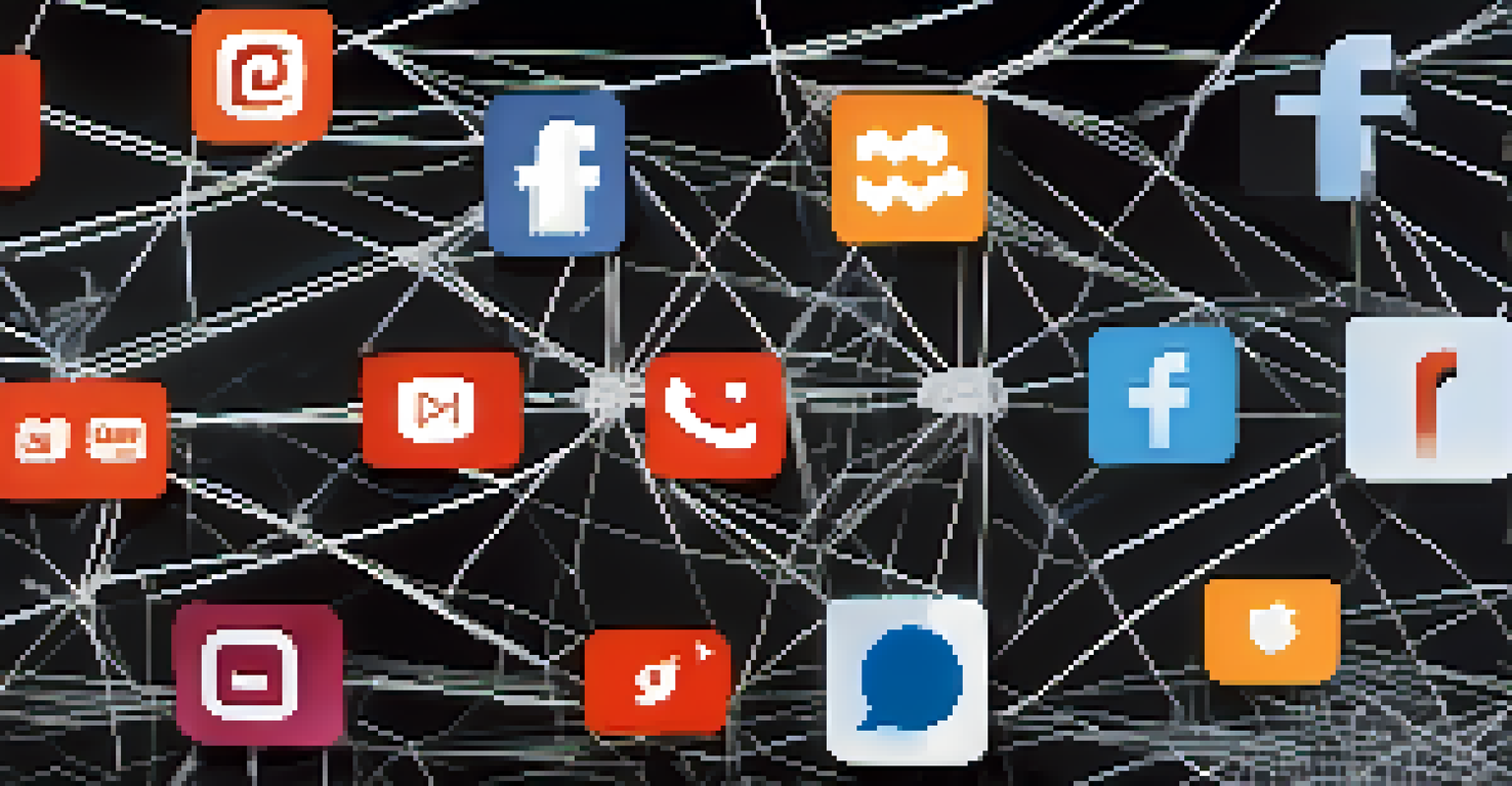Online Anonymity: Ethical Considerations and Consequences

Understanding Online Anonymity and Its Appeal
Online anonymity allows individuals to engage without revealing their identity. This can create a sense of freedom, enabling users to express themselves without fear of backlash. For many, it feels empowering, fueling honest discussions on sensitive topics like mental health or political dissent.
The internet is a powerful tool for anonymity, but it can also be a breeding ground for harmful behavior. We must navigate it with care.
However, this veil of anonymity can also lead to harmful behaviors. When people feel shielded from accountability, they may engage in cyberbullying, harassment, or spreading misinformation. The balance between the benefits and risks of anonymity is a crucial consideration in today's digital landscape.
As we delve deeper into online interactions, understanding the motivations behind seeking anonymity is essential. It can stem from a desire for privacy, protection from discrimination, or simply the thrill of being untraceable. Recognizing these diverse reasons helps us appreciate the complexity of the topic.
The Ethical Dilemmas of Anonymity Online
While anonymity can foster open dialogue, it raises significant ethical questions. For instance, is it justifiable to allow individuals to hide behind an alias when their actions can harm others? This moral quandary often leaves us grappling with the implications of our digital freedoms.

Moreover, the anonymity afforded by the internet can sometimes shield malicious actors. From trolls to cybercriminals, the lack of identifiable consequences can embolden harmful behavior. This creates an ethical dilemma: how do we protect free speech while ensuring accountability?
Anonymity: A Double-Edged Sword
While online anonymity empowers self-expression, it can also foster harmful behaviors like cyberbullying and misinformation.
Philosophers and ethicists are increasingly discussing these dilemmas, attempting to strike a balance between privacy and responsibility. As users, we must consider our roles in this complex web of interactions and how our online conduct aligns with our values.
Consequences of Online Anonymity on Society
The implications of online anonymity extend beyond individual experiences; they can shape societal norms. When anonymity becomes commonplace, it can distort our perceptions of acceptable behavior. For example, witnessing rampant negativity online can desensitize individuals to real-world consequences.
Anonymity can be a shield for the innocent and a sword for the malicious. We need to ensure it serves the former rather than the latter.
Additionally, the prevalence of anonymity can complicate law enforcement efforts. Identifying and prosecuting cybercrimes becomes a daunting task when perpetrators can hide their identities. This not only affects victims but also undermines the integrity of online spaces.
Ultimately, as society navigates these challenges, we must collectively evaluate how anonymity impacts our communities. By fostering a culture of accountability, we can enhance the positive aspects of online interactions while mitigating potential harm.
The Role of Technology in Anonymity
Technology plays a pivotal role in facilitating online anonymity. Tools like VPNs (Virtual Private Networks) and anonymous browsing services allow users to mask their identities effectively. While these technologies provide essential privacy, they can also be misused by those with nefarious intentions.
Moreover, the rise of blockchain technology and cryptocurrencies has introduced new layers of anonymity in transactions. While this can benefit users seeking privacy, it also presents challenges for regulatory bodies attempting to track illicit activities. The interplay between innovation and ethics is a dynamic and ongoing conversation.
Ethics of Online Anonymity
The ethical dilemmas surrounding anonymity challenge us to balance free speech with accountability in digital interactions.
As technology evolves, so too must our understanding of its implications. Engaging in discussions about these tools encourages responsible usage, ensuring that anonymity serves to protect rather than harm.
Online Anonymity and Mental Health
Anonymity can be a double-edged sword when it comes to mental health. For some, the ability to share experiences anonymously can be a therapeutic outlet. It allows individuals to connect with others facing similar struggles without the fear of judgment.
However, the same anonymity can also exacerbate feelings of isolation and despair. When negative comments or cyberbullying occur behind the shield of anonymity, it can have devastating effects on mental well-being. Recognizing this duality is crucial for fostering healthier online environments.
Support groups and online communities that encourage anonymous sharing can help bridge the gap. By promoting understanding and compassion, we can harness the positive aspects of anonymity while addressing its darker consequences.
Legal Perspectives on Online Anonymity
The legal landscape surrounding online anonymity is constantly evolving. Laws vary by country, with some places prioritizing freedom of speech while others impose strict regulations. This divergence adds another layer of complexity to the ethical considerations of anonymity.
For instance, many countries are grappling with how to protect users from online harassment while maintaining their right to anonymity. Legal frameworks must adapt to address these challenges effectively, ensuring that both individual rights and community safety are upheld.
Impact on Mental Health
Anonymity can provide a safe space for sharing mental health struggles, but it can also lead to isolation and negative experiences.
As legal discussions continue, it's vital for users to stay informed. Understanding the laws governing online behavior can empower individuals to navigate the digital world responsibly and ethically.
Navigating Anonymity Responsibly
As users of the internet, we have a collective responsibility to navigate anonymity thoughtfully. This means recognizing the power and potential pitfalls of being anonymous online. Engaging in respectful discourse and holding ourselves accountable can create a healthier online environment.
Additionally, fostering awareness around the consequences of our actions can lead to more conscientious behavior. By promoting empathy and understanding, we can combat the negative aspects of anonymity while preserving its benefits.

Ultimately, the goal is to create a digital space where individuals feel safe to express themselves while being mindful of the impact their words may have on others. This balance is essential for a vibrant and constructive online community.